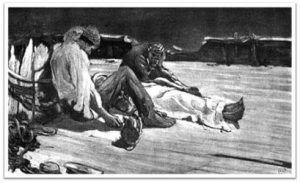A Matter of Life and Death:
Edgar Allen Poe’s The Narrative of Arthur Gordon Pym of Nantucket (1838) and Human Dignity
By Selin Kardaşlar, Cansu Kaymak, and Gizem Şeşen

In the context of the world that we live in, human life is known to be undeniably precious and one cannot take the life of another person for his own needs. Every human has the right to be protected and respected in all circumstances. It is clear, however, that our sense of human dignity is fundamentally shaped by our living conditions that are supposed to provide us with, at the very least, the basics of survival. When we regard starvation and thirst as significant threats in more “extreme” situations, we may fail to control our feelings so we cannot make rational decisions. In his novel The Narrative of Arthur Gordon Pym of Nantucket, Edgar Allan Poe furthers the idea that the human dignity must not be corrupted by anyone even in such extreme situations. The novel presents us with a situation where there is no food onboard for the survival of our main character Augustus and his three friends. A person who has suffered from starvation and thirst for twenty days can no longer make rational decisions and feels a mad desire to meet the needs of their body. Human life is trampled on by the act of cutting a person’s body into pieces as the sailors, losing control of their mental faculties, cope with starvation and thirst.
The changes in weather harden the living conditions on the ship, and days pass without any food and water. The characters’ minds become captured by the acute sense of starvation; they cannot help making decisions based on what helps them survive instead of what is right. The struggle to survive puts enormous pressure on them. Most significantly, they lose their tolerance. They do not know what their choices will lead them since their choices were made in despair. The characters’ mental condition become damaged; their minds become haunted by the desire for survival as they cannot escape from their situations. They lose the ability to control their feelings and consider the option to kill and eat one of the crew members. So, it becomes impossible to decide what is right or wrong under the pressure of extreme starvation, and they end up running against our fundamental view that human dignity should not be corrupted.
The novel shows us that when people come up against starvation, they lose their dignity and control. As we read about the extreme conditions depicted in the novel, we also begin to think of what constitutes human dignity and what living conditions are required for us to make sure that human dignity not be violated or put in question.

